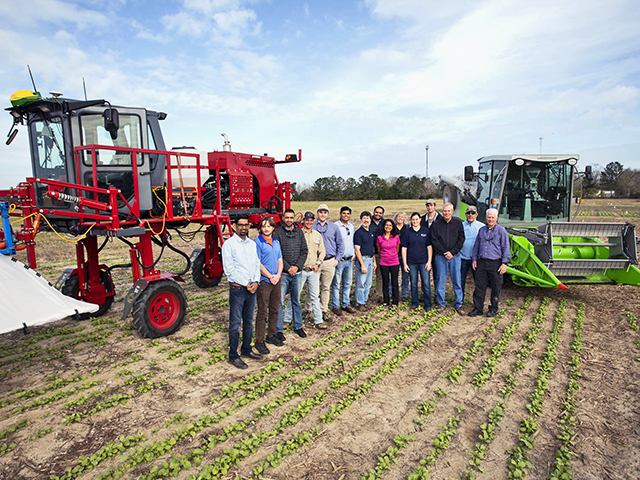Tech Tools Accelerate Innovation
Technology - Tech Tools Accelerate Innovation
For centuries, plant breeders have relied on the tedious and time-consuming process of crossing generations of plants to arrive at the desired variety. But, in today's high-tech world, they are now turning to computer power. Artificial intelligence (AI) allows plant breeders to use computer science techniques to assess the best genetics far faster than traditional breeding, accelerating the development and commercial launch of field crops and specialty crops.
At the University of Florida Institute of Food and Agricultural Sciences (UF/IFAS), Mark Settles and Marcio Resende are teaching a computer program to predict which variety of sweet corn is most likely to work in farmers' fields and on consumers' taste buds. The scientists believe the technology will let them bypass growing thousands of experimental stalks that turn out to be dead ends.
Settles uses AI and machine vision to sort seeds by the thousands to identify the most promising next-generation candidates without waiting an entire growing season to see what those seeds become. Resende employs AI to cross-check the genetics of the best bets with taste-test data and each variety's unique flavor chemistry to combine big taste and big yield.
Specifically, Settles uses machine vision, in this case a digital camera, to translate electromagnetic radiation signals into digital code to determine when a sweet corn seedling emerges from the soil. Resende sequences the genome of sweet corn lines and uses AI to predict associations between genome sequences and traits captured by machine vision. These combined technologies fast-forward sweet corn breeding.
A BIG INVESTMENT
UF is betting big on AI and other advanced technologies for agriculture. The university announced last July it would invest $70 million in AI-powered science. Agriculture is one of the four main fields of study that will get a boost from the initiative at the land-grant university.
P[L1] D[0x0] M[300x250] OOP[F] ADUNIT[] T[]
"We're excited that one of the main thrusts of UF's AI initiative is agriculture," says Florida Farm Bureau president John Hoblick. "We can't afford to wait for solutions. The AI initiative will be a game changer that can cut years off the innovation timeline. These AI-powered solutions will play out in the fields of our Farm Bureau brethren nationally."
Those solutions include going beyond plant-breeding efforts. Florida is a gateway for many pests and pathogens, and is one reason UF/IFAS employs a large and accomplished team of plant pathologists. They, too, expect a boost from AI to help accelerate early detection of plant diseases. UF/IFAS is developing AI-powered tools for farmers to scan an entire field to spot disease on a single plant before it threatens the whole crop.
DISEASE DETECTORS
UF/IFAS plant pathologists Ian Small and Mathews Paret are looking for disease in the fields of the Florida Panhandle. It's a rich agricultural region of cotton, peanuts, pine, corn, soybeans, watermelon, tomatoes and much more.
Small is developing a tractor-mounted disease detector called PhenoGator with UF/IFAS agronomist David Wright. The vehicle's 15 cameras can gather millions of images as it cruises down rows. AI is employed to make sense of that overwhelming amount of imagery. Small and Paret's objective is to make the PhenoGator so accurate, affordable and easy to operate that it becomes standard farm equipment.
Paret, along with UF/IFAS horticulturalist Josh Freeman, is also developing new disease scouting approaches with high-tech sensors on drones to fly over watermelon fields.
UF/IFAS scientists are collaborating with other researchers to apply the technologies to row-crop applications. Settles and Resende, for example, are working with Bill Tracy, at the University of Wisconsin. Tracy's deep knowledge of corn breeding and organic farmers' needs complements UF's mission to develop AI algorithms for breeding a better ear.
"Mark and I couldn't do nearly as much for the sweet corn grower or the consumer without the collaboration of Bill and our colleagues at Wisconsin, Iowa State and Washington State," explains Resende, an assistant professor in the UF/IFAS department of horticultural sciences. "AI speeds our genomic and breeding research, which likely cuts down the number of seasons it takes to deliver a new variety to farmers."
Small also collaborates with colleagues in the Midwest, notably with Purdue University agronomist Tony Vyn, as part of the Engineering Research Center for the Internet of Things for Precision Agriculture (IoT4Ag), recently financed by the National Science Foundation.
**
> Editor's note: Scott Angle is the University of Florida's vice president for agriculture and natural resources, and leader of the UF Institute of Food and Agricultural Sciences (UF/IFAS).
[PF_0321]
(c) Copyright 2021 DTN, LLC. All rights reserved.




